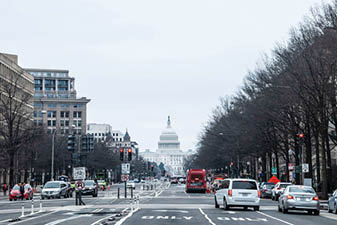|
By Cecile Entleitner, Associate, Blakey & Agnew
The passage of the landmark Infrastructure Investment and Jobs Act in November seemed to clear the way for the Administration and congressional Democrats to finalize another top legislative priority: the Build Back Better Act. The $1.75 trillion "human infrastructure" proposal includes investments in education, health care, and programs to address climate change. Transportation-related funding within the bill is focused primarily on environmental programs, such as grants and tax credits for electric vehicles – including heavy-duty commercial vehicles – and related charging infrastructure as well as provisions targeting emissions reductions. The bill would also provide an additional $600 million for Port Infrastructure Development Program grants awarded by the Maritime Administration.
After months of negotiation, the Build Back Better Act passed the House of Representatives on November 19 by a 220-213 party-line vote. However, progress on the bill stalled in the Senate, with Senators ultimately adjourning in December without reaching an agreement on the legislation's path forward. Congressional Democrats are using the budget reconciliation process for the Build Back Better Act, which would allow the Senate to bypass a potential filibuster and pass the bill by a simple majority of 51 votes. As the Senate is currently split evenly between the two major parties, this would require the support of all 50 Senators in the Democratic Caucus and Vice President Harris to act as the tiebreaker.
For some time, Senator Manchin (D-WV) has raised concerns regarding several provisions in the bill, including the amount of funding for environmental programs, the child tax credit, and the overall cost of the bill. Following individual meetings with President Biden, in mid-December Sen. Manchin, again, voiced his opposition and stated he could not support the Build Back Better Act as currently written – creating much uncertainty regarding the bill's prospects in 2022. Senate Majority Leader Schumer (D-NY) subsequently issued a letter to all Senators, stating that "the Senate will, in fact, consider the Build Back Better Act, very early in the new year …We are going to vote on a revised version of the House-passed Build Back Better Act – and we will keep voting on it until we get something done."
In early 2022, Congress will also face an important funding deadline: annual appropriations for the federal government. Although the 2022 fiscal year
|

began in October, Congress has not yet passed a long-term appropriations law providing funding for federal agencies. Instead, Congress enacted a series of short-term measures known as a continuing resolution (CR). CRs generally extend funding at previous fiscal year levels, without any significant increases or changes. The current CR is set to expire on February 18, 2022, at which time Congress must either pass its full-year appropriations bill or an additional CR to prevent a government shutdown.
When the Senate adjourned in December, officially ending its first session of the 117th Congress, it returned many of its pending Presidential nominees back to the White House. Most of these nominees – including several transportation-related positions, such as Federal Maritime Commissioner, Administrator of the Maritime Administration, and Administrator of the National Highway Traffic Safety Administration – must be re-nominated by the President in the new year. This list also included Meera Joshi's nomination as Administrator of the Federal Motor Carrier Safety Administration, however, in late-December it was announced that Joshi will soon leave FMCSA to serve as a deputy mayor of New York City. Many transportation nominees had been on hold for several weeks due to objections by Senator Scott (R-FL). In response to recent supply chain challenges, Sen. Scott stated he would place holds on any nominees to the Departments of Commerce and Transportation until the Senate schedules a hearing with Secretaries Raimondo and Buttigieg to address the ongoing disruptions and congestion. During its last week, the Senate did, however, approve the nomination of Karen Hedlund to serve as a member of the Surface Transportation Board, an independent agency. The remaining positions will likely be re-nominated by President Biden and submitted to the Senate for approval in early 2022.
Blakey & Agnew, LLC is a public affairs and
communications consulting firm based in
Washington, DC.
|


